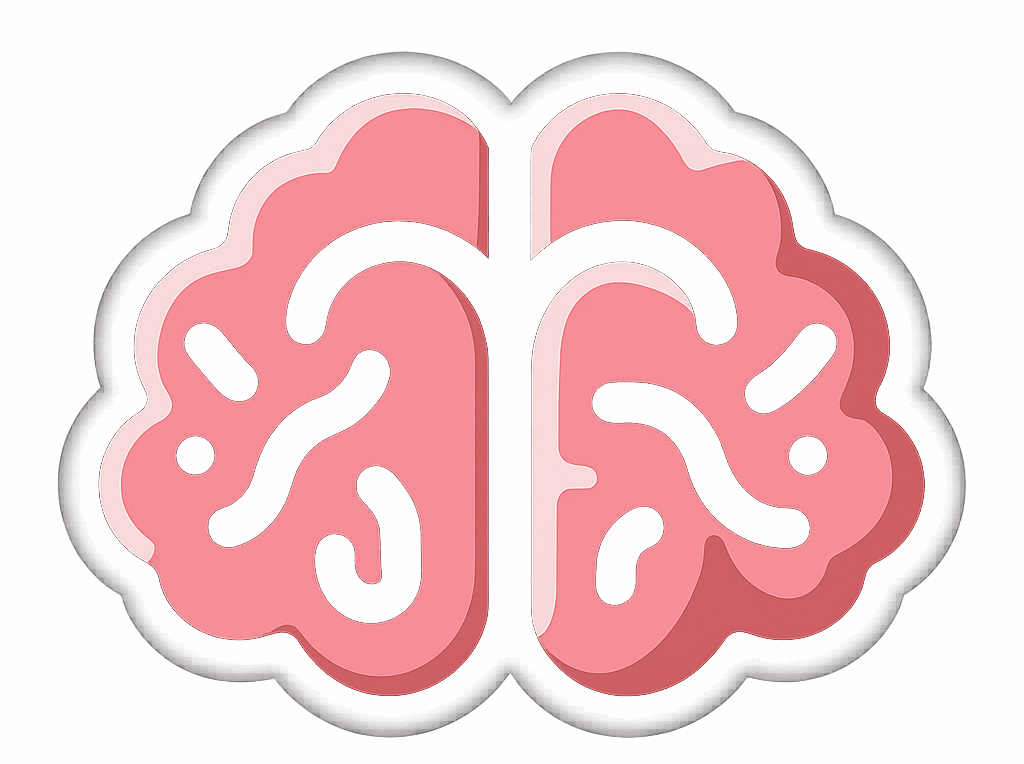Best Puzzles and Games for Memory Stimulation with Seniors: What Really Helps?
When people talk about “improving memory and cognitive skills” in older adults, puzzles and brain games often come up first. But it’s important to pause and ask: what does improvement actually mean?
The truth is, many studies show that when people practice puzzles or play brain games, they get better at those specific puzzles or games—not necessarily at functional memory or cognitive improvement for everyday life.
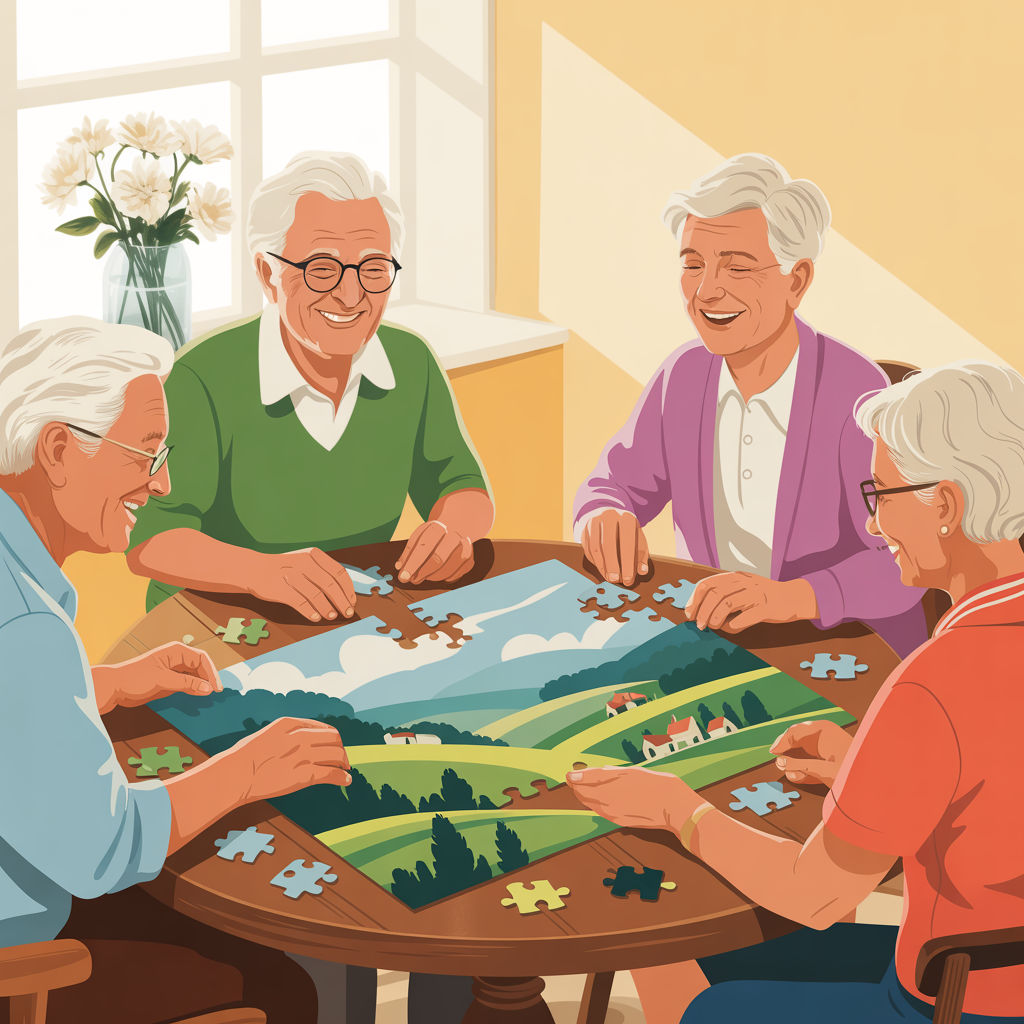
If you play video brain games every day you may improve your skill with these games, including reaction time, attention and visual processing. But you may still struggle to remember why you walked into a room, where you parked your car, or questions for your doctor. This is what researchers call limited generalization.
And while some research shows that games and puzzles can help improve attention, problem solving and visual spatial skills in some individuals, there is also research that indicates the importance of social interactions in improving and maintaining cognition in older adults. In my experience, the effect of games and puzzles is more significant when they relate to life experiences and stimulate meaningful social interactions.
In my work as a speech-language pathologist, I’ve spent decades helping older adults navigate memory changes. I’ve learned that functional memory—the kind we rely on day-to-day—isn’t just about sharper recall.
It’s also about using effective memory compensation strategies and enhancing overall cognition by staying engaged, supported, and connected. That’s why the focus should shift from improvement to stimulation, using games and puzzles that combine use of global cognitive skills with socialization.
Why “Stimulation” Matters More Than “Improvement”
The brain responds to stimulation, just like muscles do. But because not all brain activities generalize to better functional cognition and memory. I prefer the word stimulation over improvement. Stimulating memory means engaging it with novelty, challenge, emotion, and social context—conditions that activate multiple brain systems and enhance cognitive flexibility.
The best type of stimulating activities should be mildly challenging, not too easy, and possibly involving learning something new. Stimulating exercises should be adjusted to the level of an individual’s ability.
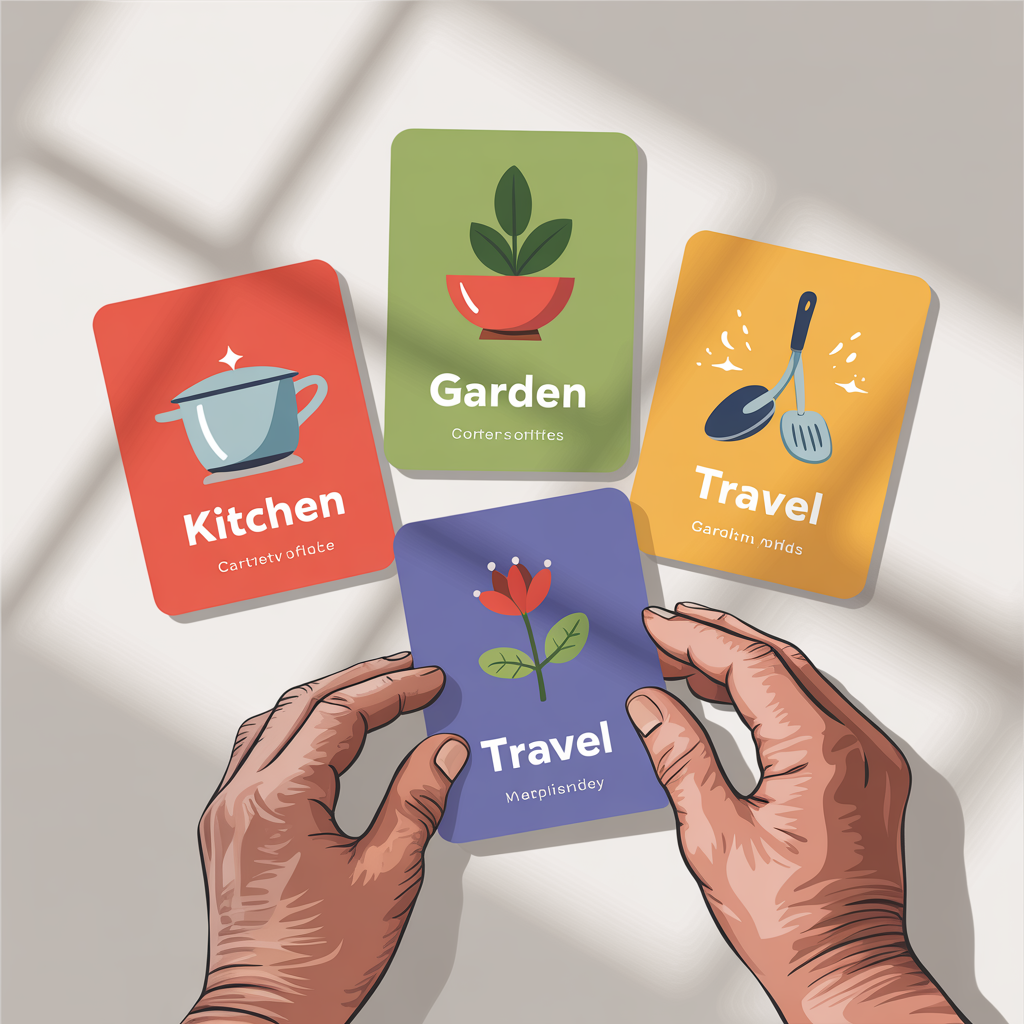
Think of Goldilocks–not too hard but not too easy–just right. Games and puzzles provide excellent sources for this type of stimulation while simultaneously facilitating enjoyable communication.
The Overlooked Power of Conversation and Reminiscing
One of the strongest forms of cognitive stimulation isn’t a puzzle or a game—it’s conversation. Research indicates that simple conversation can:
- Improve working memory (ability to recall and manipulate information long enough to use it functionally), processing speed and verbal fluency.
- Simultaneously activates language, sequencing, memory, attention, and emotional connection
- Increase dopamine and other chemicals that give a “feel good” sensation
- Stimulate additional cognitive skills such as listening, short term memory and concentration, needed to carry on a meaningful conversation
- Stimulate pragmatic skills such as turn taking, not monopolizing, eye contact and acknowledging others’ opinions which are also involved in an effective and satisfying conversation

In addition to the above benefits of simple conversation, reminiscing taps into long term memory, often well-preserved even in the presence of short-term memory loss. I’ve seen individuals who struggle with everyday recall light up and become animated when asked about their first job or favorite childhood meal. Reminiscing also provides for
- The acknowledgement of one’s life experiences and accomplishments which can improve self esteem and confidence
- Applying past life’s lessons and coping skills to current situations
- Familiar, predictable and personally significant topics which enhance communication and memory
- Opportunities for relating to others who have had similar experiences
What Puzzles and Games Are Useful
So why not choose games and puzzles that provide for both cognitive stimulation as well as opportunities for conversation and reminiscing, with laughing and fun along the way? In my experience these are the most beneficial. Here are a few types that work especially well:
1. Photo-Based Jigsaw Puzzles
Jigsaw puzzles have been shown to stimulate multiple cognitive abilities and long term memory, although not short term memory.
- Puzzles featuring nostalgic images or subjects of high interest—vintage ads, classic cars, favorite landmarks, cats—offer both visual engagement and a chance to reminisce and converse.
- Look for large-piece versions suited for aging hands and eyes.
- There are many online applications that turn a personal photo into a jigsaw puzzle.
- Start with easy puzzles and advance according to skill level.
- Engage in conversation and reminisce about the topic of your puzzle.
Conversation starter: “What kind of road trips have you taken?”
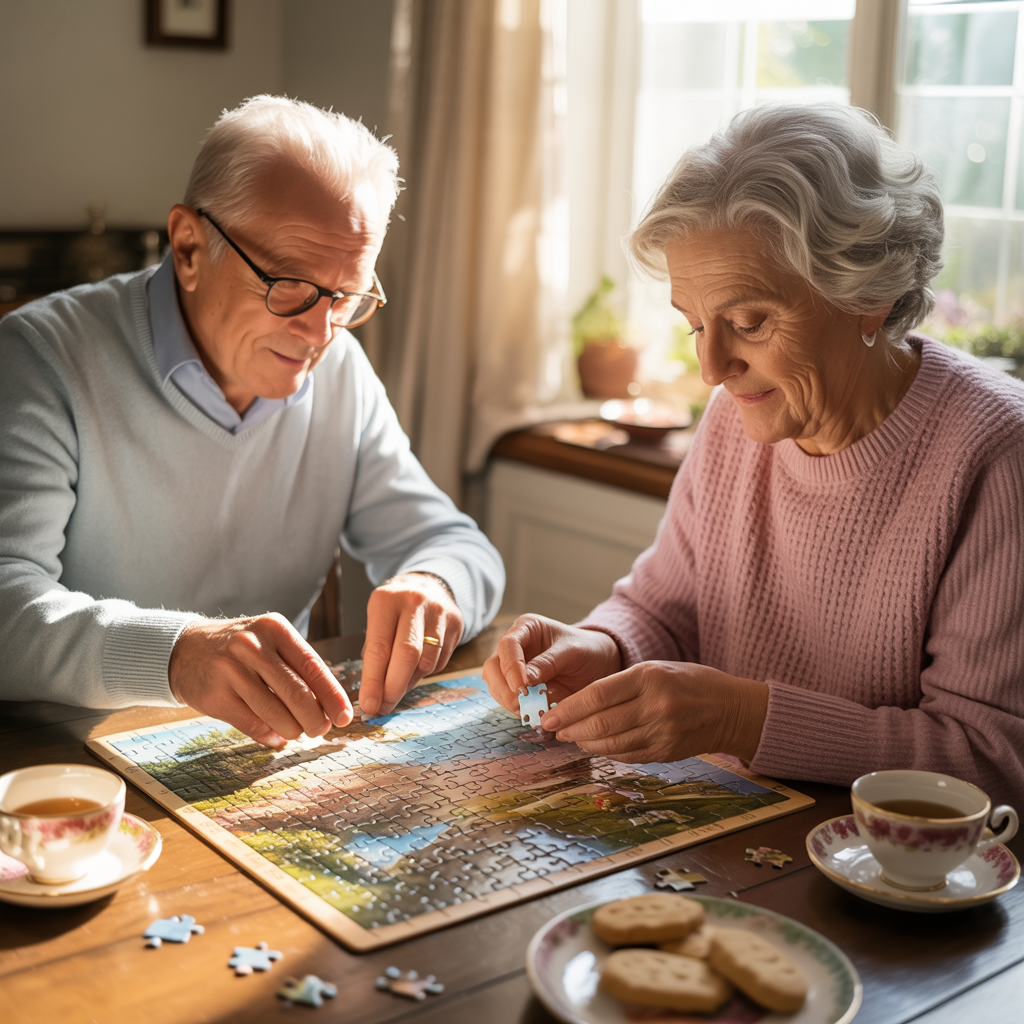
2. Category and Word Association Games
- Naming items in a category (“things in the kitchen,” “summer activities”) engages memory and language without pressure.
- These games can be adapted for any cognitive level and often lead to spontaneous stories.
- Adapt any games to the skill level of the participant(s).
- Scattergories is a game that targets these skills. Scattergories Junior may be better for some who are having cognitive difficulties.
- Many types of these activities can be found online.
Conversation starter: “What types of pizza can you think of?”
3. Reminiscence Card Sets or Magazines
- Games designed to prompt storytelling—using old-time photos or open-ended questions—are great for one-on-one or small-group use and can unlock deep, joyful memories.
- Personal photos are great for this.
- Many free reminiscence activities are available online.
Conversation starter: “What was your first car? Tell me about it.”
4. Music-Based Activities
Music is deeply tied to memory. Games that involve naming tunes, singing lyrics, or discussing favorite artists stimulate multiple brain areas—and often spark spontaneous reminiscing. Singing also stimulates verbal fluency, a problem for some.
Conversation starter: “What is your favorite type of music?”
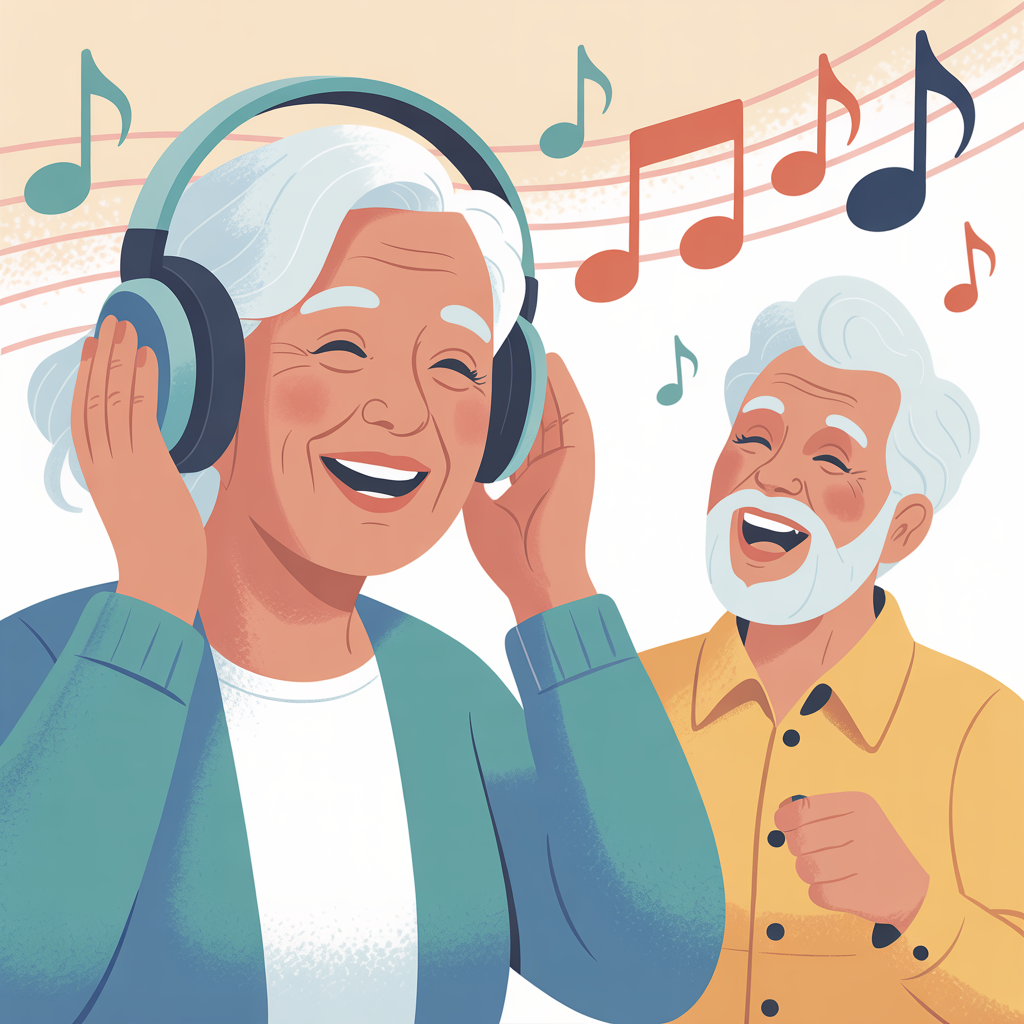
5. Topic Cards or Conversation Starter Decks
These are sets of cards with topics that can vary widely, such as ice-breakers, funny questions or even deeper philosophical questions. Check out what is available online that might be appropriate for you and your conversation partner(s).
Conversation starter: “What would you do if you inherited a million dollars?”
6. Simple Riddles and Jokes
Short, playful riddles and jokes are fun and low-stakes. Shared in a group, they spark laughter, discussion, and creative thinking. Understanding humor is cognitive skill because it is often implied or inferred. Keep it light—avoid anything that feels like a test.
7. Crossword puzzles
Some research indicates that doing crossword puzzles helps cognitive functioning. They definitely stimulate word finding and language functioning.
- I like doing them as a team with one person giving the clues and the other(s) thinking of the answers. This is also a good strategy for someone who has visual or writing problems.
- Make sure the puzzles are somewhat challenging but not too difficult,
- Give hints as needed.
- Encourage any conversation or memories associated with the target words.
Conversation Starter: I remember seeing many terns (sea bird) on our trip to______.
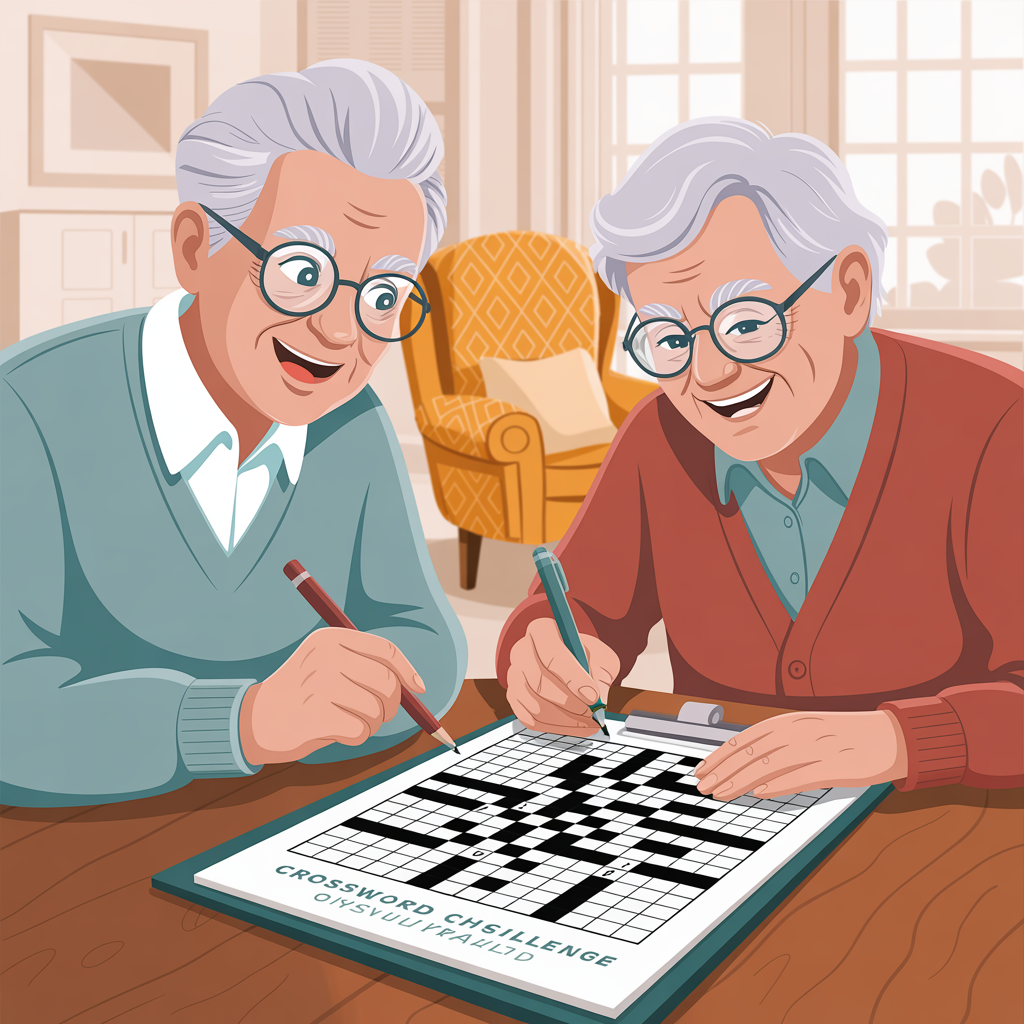
8. Trivia
- Provides opportunities for word finding
- Stimulates long term memory
- Pulls from the general fund of knowledge
- Can be fun
- Can build self esteem and confidence; it feels good to know the answer.
- Can be frustrating if too difficult, so adapt the level as needed. A junior trivia game or card set might be more appropriate for some individuals.
- Can stimulate conversation and memories associated with the answer
Conversation starter: Remember when we went to Disneyland?

9. Card Games
- For those with cognitive impairment, simple card games such as War or Go Fish can be stimulating, satisfying and fun.
- Gin Rummy offers opportunities for sequencing, sorting and short term memory.
- Bridge, Hearts and Spades are higher level games that stimulate memory, planning, problem solving and attention/concentration.
- Choose games with a level of difficulty is “just right” for your partner(s).
- Playing card holders may be needed for individuals who have trouble holding cards.
Other games that facilitate cognitive function and social interaction can be helpful, but may also be too difficult for someone with cognitive impairment. Try games such as Password, Boggle, Scrabble, Apples to Apples and board games but adapt the rules as needed based on ability. Games a person has played before and is familiar with may be easier and more enjoyable.

What to Avoid
- Overly technical “brain training” programs that promise results without connection to daily life.
- Games that feel childish or patronizing, which can backfire and reduce engagement.
- Solo puzzle routines that become repetitive or isolating.
Cognitive stimulation should feel enjoyable and affirming—not like schoolwork. Tasks should not be so hard that they are frustrating or discouraging, but a little challenge can be beneficial.
When Puzzles or Games Aren’t the Best Fit
Not everyone enjoys them. For some, they can feel tedious or frustrating. Individuals with visual impairments may not see well enough to participate in some types of games. In those cases, focus on what does feel natural—storytelling, singing, movement, routine and sharing through conversation and reminiscing.
For someone with memory problems, use compensatory strategies: calendars, written reminders, environment cues and a memory notebook. Using these external supports is a form of memory improvement – it just looks different and it requires a certain level of cognitive skill to use these strategies effectively See varied memory strategies at Memorychitchat.com
Stimulating memory and cognition isn’t just about what happens inside the brain. It’s about creating interactive opportunities and providing an environment for self expression. Games and puzzles, especially those that provide social interaction, conversation and reminiscing can be the most effective and enjoyable.
The Bottom Line
If you’re looking for the best puzzles or games for memory stimulation in seniors, choose ones that spark conversation, bring up memories, and create shared moments. That’s where the added benefit lies—not just in the puzzle itself, but in the stories it unlocks and the relationships it strengthens.
And as an adjunct to puzzles and games, take a look at Memory Chit Chat.com. It’s a simple, practical way to bring connection and cognitive stimulation into daily life using conversation, reminiscing and other cognitive/linguistic activities. There are 52 weekly lessons based on social themes.
Barbara Van Dyne, M.A., speech-language pathologist has worked for decades in a variety of rehabilitation settings, including inpatient and outpatient rehabilitation, home health, private practice and skilled nursing facilities.
She holds a Master's Degree from The University of Kansas in Speech and Language Pathology.
She is the author of Memory Chit Chat, a clinical manual with exercises that leverage social themes for therapeutic purposes offers meaningful engagement, repetition, familiarity, personal relevance, and a connection to seasonal and cultural events
She has taught memory improvement classes and served on the advisory board of the Stroke Support Group of Northern California. Prior to her retirement she was certified by the American Speech and Hearing Association and licensed as a speech pathologist in the state of California.
